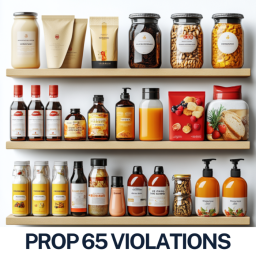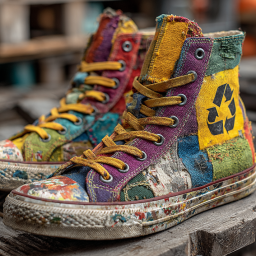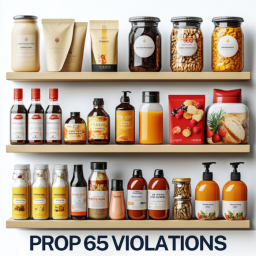
California Proposition 65 Enforcement: August 2025 Update
California Proposition 65 enforcement remained strong in August 2025, with 341 Notices of Violation (NOVs) filed. The most frequently cited chemicals included lead, cadmium, phthalates, BPA/BPS, PFAS, and diethanolamine. Enforcement actions once again targeted high-risk industries such as food, supplements, cosmetics, household packaging, and retail goods.
For companies manufacturing, importing, or selling in California, this month’s notices emphasize the need for proactive Prop 65 compliance programs. Businesses should monitor ongoing litigation trends, test supply chains, and review warning label obligations to mitigate exposure to costly lawsuits.
August 1–31, 2025 Proposition 65 Notices of Violation Summary
| Number of Violations | Listed Chemicals | Types of Products Targeted |
| 163 | Lead, Cadmium | Seafood (anchovies, clams, shrimp), ceramic mugs, tools, utensils |
| 74 | Phthalates (DEHP, DINP, DBP) | Cosmetic bags, vinyl covers, plastic cases, children’s goods |
| 31 | Bisphenol A (BPA), Bisphenol S (BPS) | Thermal receipt paper, food containers, canned goods |
| 8 | PFAS (PFOA, PFOS, PFNA) | CBD oils, waterproof packaging, personal care products |
| 6 | Diethanolamine, cocamide DEA | Lotions, shampoos, grooming products |
What is Proposition 65 and Why Does It Matter?
Proposition 65, formally the Safe Drinking Water and Toxic Enforcement Act of 1986, requires businesses to warn Californians about exposures to over 900 listed chemicals. These chemicals include lead, cadmium, phthalates, BPA/BPS, and PFAS—substances often found in food, packaging, cosmetics, and consumer goods.
Violations can lead to:
- Civil penalties of up to $2,500 per violation per day
- Product reformulation, mandatory warning labels, or recalls
- Expensive litigation and settlement costs
Prop 65 Enforcement Trends – August 2025
Lead and Cadmium in Food & Utensils
Heavy metals remain the top enforcement drivers. Seafood, ceramic mugs, and metal tools were repeatedly flagged for lead and cadmium contamination. Importers of food products face especially high risk. (See our Food Recall Tracker for the latest recalls involving heavy metals in food.)
Phthalates in Vinyl Accessories
DEHP and DINP violations persisted across vinyl pouches, cosmetic bags, and children’s goods, underscoring scrutiny of flexible plastics and soft materials.
Bisphenols in Labels and Packaging
BPA and BPS were cited in thermal receipts, canned goods, and packaging. Because BPS lacks a safe harbor level, retailers and food brands remain highly exposed.
PFAS in Cosmetics, CBD, and Packaging
Notices citing PFOA and PFOS involved CBD oils, waterproof containers, and cosmetic packaging, highlighting growing PFAS risks where safe harbor levels are absent. Cannabis and hemp-derived products continue to face Prop 65 scrutiny, with multiple notices citing CBD topicals and edibles.
Diethanolamine in Personal Care Products
Lotions, shampoos, and styling products continue to draw scrutiny for diethanolamine, a known carcinogen under Prop 65.
Product Categories Most Frequently Targeted
Food & Beverage
- Anchovies, clams, shrimp, and sardines
- Canned sauces and condiments
- Protein powders and dietary supplements
Beauty & Wellness
- CBD oils, balms, and topicals
- Lotions, shampoos, body washes
- Cosmetic bags and plastic cases
Household & Retail Packaging
- Thermal receipt paper and shipping labels
- Ceramic mugs and cookware
- Vinyl covers and pouches
Tools & Art Supplies
- Scissors, knives, and metal utensils
- Artist paints and ceramic glazes
Top Chemicals and Companies Cited
Top Chemicals (August 2025)

Top 25 Companies Cited

Top 10 Most Cited Companies
| Company | Notices Received |
| Walmart Inc. | 15 |
| Amazon.com, Inc. | 12 |
| The TJX Companies, Inc. | 11 |
| Target Corporation | 9 |
| Ross Stores, Inc. | 8 |
| Gelson’s Markets | 7 |
| Sprouts Farmers Market | 6 |
| Burlington Stores | 6 |
| CVS Pharmacy | 5 |
| Hobby Lobby Stores | 5 |
Top Noticing Parties – August 2025
Top 10 Noticing Parties
| Noticing Party | Notices Filed |
| Environmental Health Advocates, Inc. | 286 |
| Center for Consumer Safety, LLC | 45 |
| Ecological Alliance, LLC | 42 |
| CalSafe Research Center, Inc. | 38 |
| Gabriel Espinoza | 31 |
| Ema Bell | 23 |
| Consumer Rights Advocates, LLC | 21 |
| Dennis Johnson | 20 |
| Consumer Advocacy Group, Inc. | 18 |
| Keep America Safe and Beautiful | 16 |

What Risks Do Licensors Face When Licensees Trigger Prop 65 Violations?
Even if you don’t make or distribute the product, your brand name on packaging can expose you to liability.
Best Practices for Licensors:
- Require Prop 65 compliance clauses in license agreements
- Mandate periodic chemical testing by licensees
- Include indemnity and insurance protections
- Monitor licensee e-commerce listings for Prop 65 risks
How Can My Company Avoid a Prop 65 Lawsuit?
- Test Products and Packaging – Use third-party labs to screen for metals, phthalates, PFAS, and bisphenols.
- Update Warning Labels – Ensure compliant, chemical-specific warnings on packaging and online.
- Strengthen Supplier Agreements – Add Prop 65 warranties and indemnities.
- Monitor Enforcement Trends – Track competitor notices; if others in your category are targeted, you may be next.
- Engage Legal Counsel Early – Juris Law Group can assess claims, coordinate testing, negotiate settlements, and defend in court.
How Juris Law Group Can Help
Juris Law Group, recognized in Chambers USA, is a trusted advisor to food, beverage, supplement, and cosmetic brands navigating Proposition 65. Our services include:
- Compliance audits and proactive testing strategies
- Tailored Prop 65 warning label programs
- Supply chain contract reviews with indemnity protection
- Aggressive defense of 60-day notices
Frequently Asked Questions (FAQ)
Q1: Does Prop 65 apply to naturally occurring metals?
Yes. Even naturally occurring lead and cadmium in foods such as seafood, cacao, and turmeric can trigger Prop 65 violations if exposure exceeds the state’s limits.
Q2: Are retailers liable for online sales?
Yes. Online listings targeting California consumers must include clear Prop 65 warnings before checkout. Retailers can be cited if warnings are missing, even when selling through third-party platforms like Amazon or Etsy.
Q3: What should I do if my supplier is cited?
Retailers and distributors should review contracts to ensure suppliers indemnify them for Prop 65 liability. Even if you did not manufacture the product, your brand can still be named in enforcement actions.
Q4: What are safe harbor levels?
Safe harbor levels are thresholds below which Prop 65 warnings are not required. Many chemicals actively cited in August 2025—including BPS and PFAS—do not have safe harbor levels, making even trace exposures a litigation risk.
Q5: Are PFAS enforcement actions here to stay?
Yes. PFAS (such as PFOA and PFOS) are persistent, bioaccumulative chemicals that remain a top priority for both regulators and plaintiffs. Recent notices in CBD oils, cosmetic packaging, and waterproof goods confirm PFAS enforcement will continue to expand.
Want to Protect Your Brand from a Prop 65 Lawsuit?
Contact us today and check our monthly Prop 65 Newsletter.















